

Basic Moral Theories Essentialized. [Click for a PDF of the full chart] Human action, whether by individuals, groups, or governments, is driven by ideas—most substantially by the ideas people accept as morally correct.
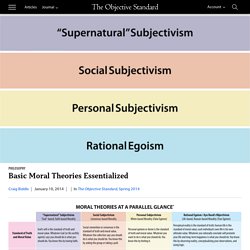
The rise of the quasi-public space and its consequences for cities and culture. A new phenomenon is emerging in London: quasi-public spaces.
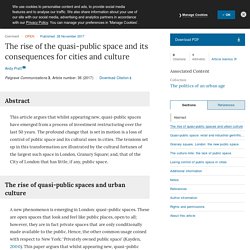
These are open spaces that look and feel like public places, open to all; however, they are in fact private spaces that are only conditionally made available to the public. Hence, the other common usage coined with respect to New York: ‘Privately owned public space’ (Kayden, 2000). This paper argues that whilst appearing new, quasi-public spaces have emerged from a process of investment restructuring over the last 50 years. The profound change that is set in motion is a loss of control of public space and its cultural uses in cities. There is a long history to the notion of providing public spaces in cities, often linked to the notion of the agora, symbolising democratic processes (Sennet, 1999). Drought: A cause of riots. Let’s Get Real: What an Average Retirement Costs. The gray-haired couple sipping champagne on a beach at sunset.
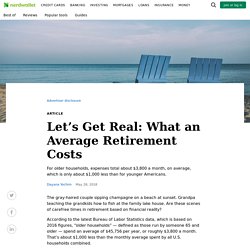
Grandpa teaching the grandkids how to fish at the family lake house. Are these scenes of carefree times in retirement based on financial reality? According to the latest Bureau of Labor Statistics data, which is based on 2016 figures, “older households” — defined as those run by someone 65 and older — spend an average of $45,756 per year, or roughly $3,800 a month. Older Workers See Lower Response Rates From Recruiters. Getty Images Boomer applicants receive a lower rate of response from employers than millennials.
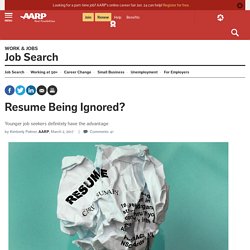
If you feel like submitting your résumé for a job is the equivalent of sending it into a black hole, the problem might be with how old your résumé makes you look. And if you’re a woman, the problem is even worse, according to research published this week by the Federal Reserve Bank of San Francisco. To test for age discrimination in the job application process, researchers created fake résumés for people in different age groups. Millennials Can Count on Social Security After All. Health care will cost $280,000 in retirement — and that doesn’t include this huge expense. The cost of health care for a 65-year-old American couple retiring this year rose to $280,000 — a mere 2% if that’s any comfort — but that’s no reason for a sigh of relief.
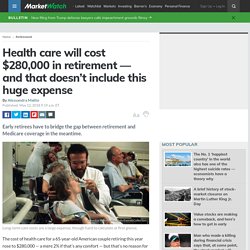
The figure doesn’t include long-term care costs, and it’s going to go up every year for the foreseeable future, experts said. The estimate, calculated by Fidelity Investments, has jumped 75% since the company’s first estimate in 2002 (then $160,000). The figure includes life expectancies for the couple, and also includes Medicare coverage and copays, vision, over-the-counter medications and dentures.
The $80 billion fitness industry sees huge growth in this demographic See: How to plan for health care in retirement without going broke Without much doubt, the cost of health care in retirement will continue to rise, said Hope Manion, senior vice president and health actuary at Fidelity Investments Benefits Consulting. There may be one big reason why suicide rates keep climbing in the US, according to mental-health experts. If the economy is 'roaring', why are so many Americans still struggling?
Donald Trump tells us every day the US economy is “strong”, “booming” and “roaring”.
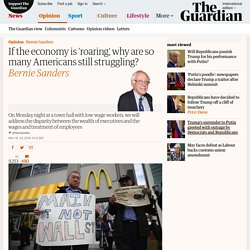
Yes. The moral consequences of economic growth 0. How economics became a religion. Although England has an established church, few of us today pay it much mind.
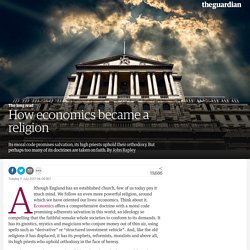
Augmented Reality is making industrial work more productive. Veolia Water Technologies, a transnational water treatment specialist firm, is partnering with a company called Fieldbit to bring Augmented Reality to the plant floor.

Don't feel bad if your first reaction to that statement is "huh? "—ours was, too. If you've ever had to work on unfamiliar or semi-familiar physical equipment, though, it gets pretty interesting. Facebook, Google and others join The Trust Project, an effort to increase transparency around online news. “Fake news” and other misinformation, online propaganda, and satirical content people believe is true have filled the web via search engines and social media, and have caused a rift in how people perceive today’s news organizations and the quality of their coverage.
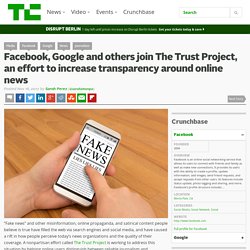
A nonpartisan effort called The Trust Project is working to address this situation by helping online users distinguish between reliable journalism and promotional content or misinformation. Today, a key part of that effort – called “Trust Indicators” – are going live on Facebook, offering easy-to-access, transparent information about a news organization’s ethics and practices. Here’s how this will work in practice: starting today on Facebook, an icon will appear next to articles in the News Feed. Can decomposers and parasites be included in food webs and food chains? Human sound systems are shaped by post-Neolithic changes in bite configuration. Machine Bias. On a spring afternoon in 2014, Brisha Borden was running late to pick up her god-sister from school when she spotted an unlocked kid’s blue Huffy bicycle and a silver Razor scooter.
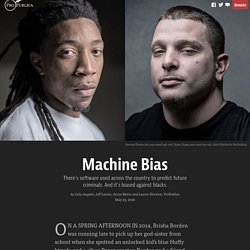
Borden and a friend grabbed the bike and scooter and tried to ride them down the street in the Fort Lauderdale suburb of Coral Springs. Just as the 18-year-old girls were realizing they were too big for the tiny conveyances — which belonged to a 6-year-old boy — a woman came running after them saying, “That’s my kid’s stuff.” Making Systems Thinking More Than a Slogan. From climate change and deforestation to collapsing fisheries, species extinction and poisons in our food and water, our society is unsustainable and it is getting worse fast.
Many advocate that overcoming these problems requires the development of systems thinking. We’ve long known that we live on a finite “spaceship Earth” in which “there is no away” and “everything is connected to everything else.” The challenge lies in moving from slogans about systems to meaningful methods to understand complexity, facilitate individual and organizational learning, and catalyze the changes we need to create a sustainable society in which all can thrive. Here, I’ll describe how the world operates as a system — and how businesses can respond effectively to the challenges we face. Systems thinking is used in the World Economic Forum report (2011) Wicked problem. A wicked problem is a problem that is difficult or impossible to solve because of incomplete, contradictory, and changing requirements that are often difficult to recognize.
It refers to an idea or problem that can not be fixed, where there is no single solution to the problem. The use of the term "wicked" here has come to denote resistance to resolution, rather than evil.[1] Another definition is "a problem whose social complexity means that it has no determinable stopping point".[2] Moreover, because of complex interdependencies, the effort to solve one aspect of a wicked problem may reveal or create other problems. Characteristics[edit] “Wicked” problems: What are they, and why are they of interest to NNSI researchers? – Network for Nonprofit and Social Impact.
By: Katherine Cooper Not too long ago, I sat in on a meeting of local leaders as they wrestled with an education initiative that they were trying to implement in the community. Although the group’s goal sounded simple enough – introducing literacy programming into existing school and community projects – the conversation soon became complicated. There is a clear link between improving literacy and improving educational outcomes, but what else poses a problem to educational achievement? The conversation soon turned to a discussion of racial disparities in the community, the failure of schools and nonprofits to recognize and address trauma in student populations, impending budget cuts, and the challenges of sharing data across schools and social service providers. Jane Jacobs and the Problem of Monstrous Hybrids.
I recently finished reading Systems of Survival. Can Speculative Design make UX better? (design trend 4/4) The World Counts - Environmental facts and live statistics. Going beyond recycling: How to get started reducing and repurposing plastic - Noted. It’s World Clean Up Day this Saturday 15th September, a reminder that our ever-growing waste problem isn’t going away anytime soon.
Palm Oil Was Supposed to Help Save the Planet. Instead It Unleashed a Catastrophe. A few days later, we drove north, 20 hours on punishing mountain roads, toward the Malaysian border and the West Kalimantan district of Sintang. There, a meeting was planned with the local county governor, or bupati, to discuss a similar situation. How Student Centered Is Your Classroom? The Density Divide: Urbanization, Polarization, and Populist Backlash - Niskanen Center. In this new paper, I weave recent research in political science, economics, psychology and more into an account of political polarization and the rise of populist nationalism as a surprising and overlooked side-effect of urbanization. Toxic Nostalgia Breeds Derangement. Reciprocity Norm. Double tipping points in 2019: When the world became mostly rich and largely old. Did Money Evolve? You Might (Not) Be Surprised. Capitalism in crisis: U.S. billionaires worry about the survival of the system that made them rich.
Some Assumptions of Capitalism. The simple but ingenious system Taiwan uses to crowdsource its laws. The Future of Banking Depends On Open Banking APIs. The Future of Banking Depends On Open Banking APIs. The 2010s Have Broken Our Sense Of Time. Astronomy Answers: Daylight Savings Time. Viewables. How the American Media Fuels A Cycle of Violence. How the rich get richer – money in the world economy. AIyaiYAIyiyAI. Engineerable Feats.
Escapades. Eternity. Intelligences Ensemble. Govern.Mental. Planetary. Organics. Planted Projects. SCIENCE Breakthroughs. Time Well Spent. WEATHER. US.A.ID. WorldWide. Individuation. Eco.logic. More or less.